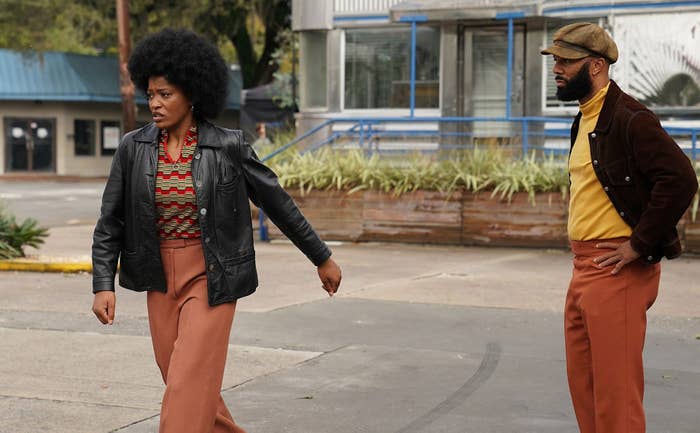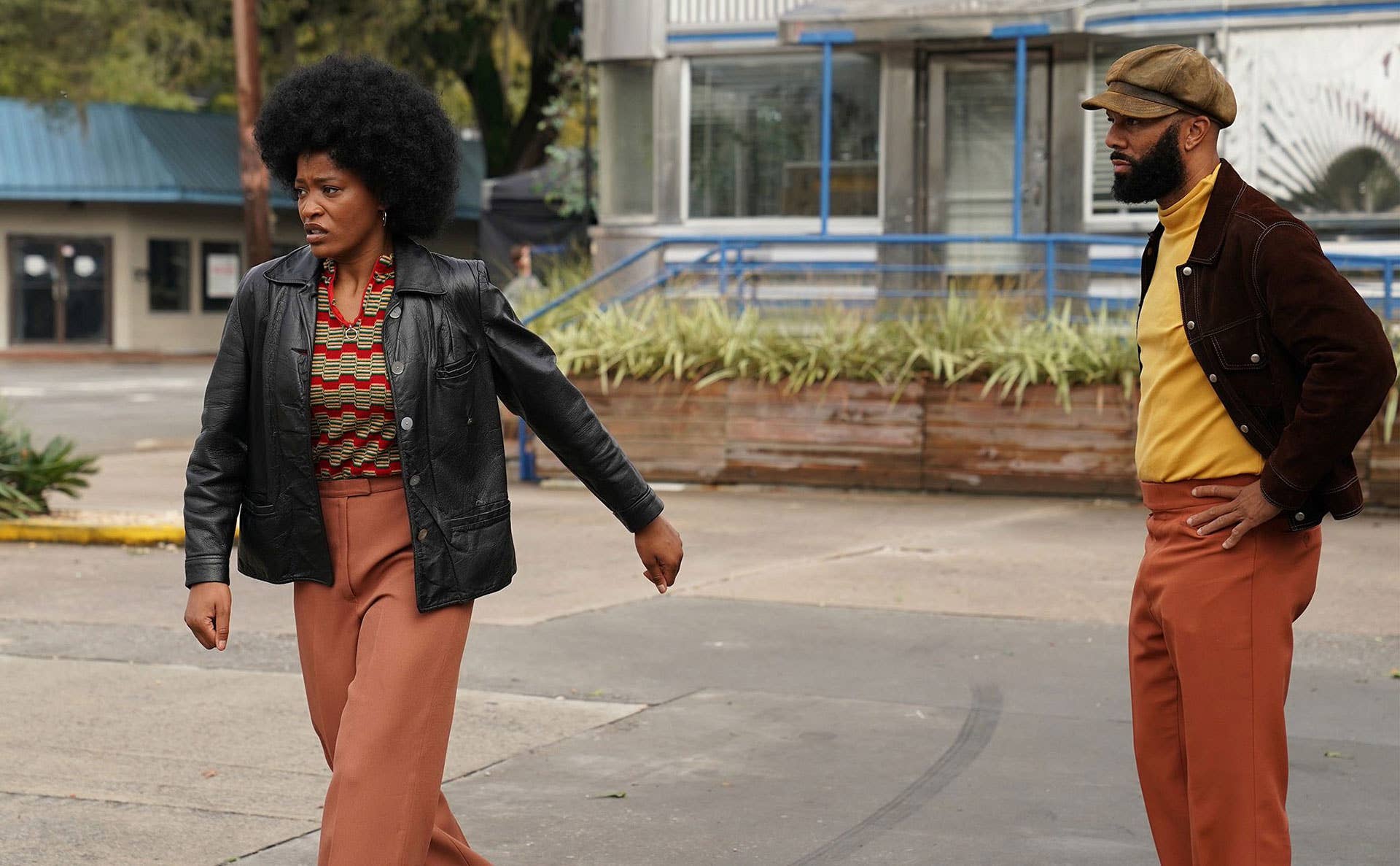
The Toronto Black Film Festival (TBFF) is back and returning to theatres. TBFF 2022 offers a hybrid festival for audiences to enjoy Black stories both on the big screen and in the comfort of their own homes. It provides viewers a chance to come together while catching some of the most acclaimed Canadian and international works by and about Black voices. This year’s line-up includes a Toronto encore of Yasmine Mathurin’s award-winning documentary One of Ours (one of our picks for the best Canadian films of 2021), along with hits from festivals like Sundance.
Of special note is the ‘Being Black in Toronto’ series, which spotlights local talents. Niya Abdullahi’s Home, for example, offers a perspective on what it means to be Black and Muslim in Toronto in 2022. CJ Mayers’ Knowledge Is Power, meanwhile, looks at the failures of the education system to reflect Black identities and experiences. Rennae Byfield’s Born in Sin reflects upon motherhood, while KhaRå Martin’s The Idea of the Black Dollar asks if a Black Wall Street is on the horizon as it follows female entrepreneurs setting up shops amid COVID. The local flavours screen with like-minded shorts from Halifax and Montreal to offer a fuller spectrum of Black experiences seen through the eyes of young Canadian filmmakers.
After taking in the local fare, here are six films to see at this year’s Toronto Black Film Festival, which runs Feb. 16 to 21. Grab tickets here.
Alice
View this video on YouTube
After attending a screening of the landmark 1973 Blaxploitation flick Coffy, Alice (Keke Palmer) embraces her inner Pam Grier and embarks on an odyssey of violent, revenge-seeking badassery. The catch is that Alice recently escaped a plantation in what she believed to be the 1800s. As she stumbles through a rabbit hole, she learns that she’s been in bondage 100 years after abolition. Once a slave, but now a free woman, Alice decides to kick some ass and get even with those who enslaved her. Alice kicks off this year’s Toronto Black Film Festival following an acclaimed debut at the Sundance Film Festival where critics and audiences noted the fresh perspective of director Krystin Ver Linden in her feature debut, as well as the electrifying performance by Keke Palmer, who’s come a long, long way since Akeelah and the Bee. A sharp supporting turn by Common makes Alice the most star-studded flick in the TBFF line-up and an energetic choice for opening night. The craziest plot twist, though? Alice is based on a true story.
With Wonder
View this video on YouTube
Sharon Lewis broke ground for Black representation in Canadian film with her sensational performance in Clement Virgo’s 1995 landmark Rude. The reputation built with that credit alone makes Lewis worth noting whenever she appears in a line-up, but more recently, she’s been turning heads with her work as a director. With Wonder is Lewis’s latest feature documentary after the Canadian Screen Award nominated drama Brown Girl Begins. This intimately personal work proudly creates space for diverse perspectives in the way that Rude did over 25 years ago. With Wonder considers the perspectives of LGBTQ+ people of colour who are also people of faith. The film offers candid confessionals with queer people who reflect upon the challenges of reconciling their faith with their sexual orientations and their true selves. Lewis creates a safe and inclusive space where audiences can connect questions about their right to believe with their right to love, particularly as institutional aspects of organized religion continue to lag behind the times.
Black Mail
View this video on YouTube
Nigerian director Obi Emelonye delivers an intense thriller from across the pond with Black Mail. The film stars O.C. Ukeje as Chinda, a young actor who finds himself trapped in an online extortion scheme. Black Mail flips the script on stories of Nigerian email phishers popularized in books like 419 as Chinda becomes the target of a Russian sex trafficking ring looking for a Black man to take the fall. The film is a tense production from a director who’s been notably prolific during the pandemic, delivering four films in under two years. The London-shot production offers a taste of the slick and swift talent coming out of Nigeria, especially as artists move to bigger markets with robust productions. Black Mail is a gripping cat and mouse flick that accompanies of big bowl of popcorn nicely to provide cinematic escapism, but it’s also a fair snapshot of growing international currents in Black film.
President
View this video on YouTube
One of fifteen films shortlisted for the Best Documentary Feature this year, President finally lands in Toronto after an acclaimed run on the festival circuit. The film picked up a special prize for verité filmmaking at Sundance, and has captivated audiences with director Camilla Nielsson’s portrait of the pro-democracy movement in Zimbabwe. President is a follow-up to Nielsson’s 2014 doc Democrats, which observed political leaders drafting Zimbabwe’s constitution and, ironically, was banned in the country on grounds that its contents were not of public interest. This time, Nielsson gains intimate access to Nelson Chamisa, the 40-year-old head of the MDC Alliance and official opposition to the ruling party after the downfall of President Robert Mugabe. The film observes the charismatic leader rallying Zimbabweans with his stirring speeches and anti-corruption stance, drawing comparison to Nelson Mandela and Barack Obama, if glossing over some of Chamisa’s own problematic politics in the service of a stirring portrait. President has only gained resonance since its Sundance premiere in 2021, following two assassination attempts on Chamisa’s life, including one while on the campaign trail promoting voters’ rights.
Queen of Glory
View this video on YouTube
Nana Mensah is a star on the rise! The multi-hyphenate artist can be seen in film and television everywhere you look these days. From supporting turns in the Netflix series The Chair and Bonding to brief but memorable appearances in films like The King of Staten Island and the upcoming After Yang, Mensah has terrific screen presence. Yet she gets her first true lead role in Queen of Glory, after writing the screenplay and stepping behind the camera to direct herself. The film appropriately tells of a young woman carving her own path and navigating questions of identity in America. Playing Sarah, whose plans to follow love to Middle America are derailed following the death of her Ghanaian-American mother and the arrival of her estranged father, Mensah explores what it means for children of immigrants to veer from the expectations their parents imagined after moving to provide opportunities of which they could only dream. The film displays a fine hand at understated comedy and a deft sense of character. It’s a refreshing look at family and coming of age, even after you think you have life figured out.
Alone (Seuls)
View this video on YouTube
Canadian director Paul Tom was born in a refugee camp in Thailand while his parents fled Cambodia in the early 1980s. The director draws upon his experience growing up as an immigrant in Canada to share the stories of minors who begin their lives anew in the land of the Maple Leaf. Alone draws upon a mix of live action interviews, observational footage, and minimalist animation to explore the paths that brought young refugees Afshin, Alain, and Patricia to Canada. The animated sequences highlight the subjects’ perspectives as children, while the live action elements inject their contemporary voices into the tale. Following the recent success of Flee, Alone demonstrates how animation and documentary can work in harmony to tell stories that might not be as easily accessible in traditional forms of non-fiction storytelling. It’s also an inspiring essay on the lives saved by helping hands at home, and a lesson on what Canadians can do to make their cities more welcoming for refugees starting anew. (Avoiding cacophonous caravans with Confederate flags, for one, might be a start.)








